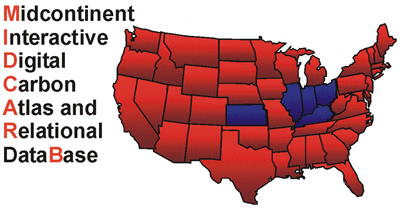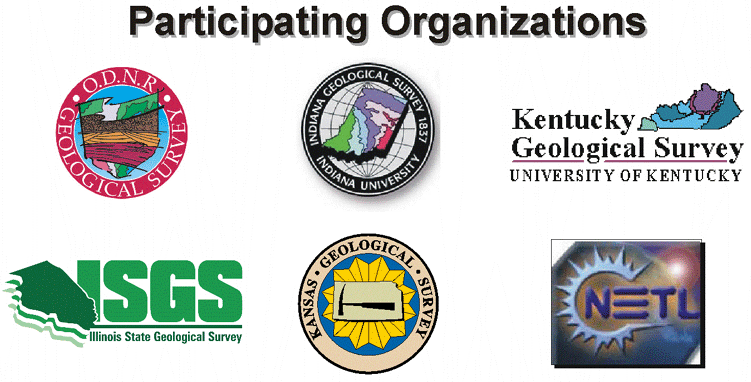
Midcontinent Interactive Digital Carbon Atlas and
Relational Database (MIDCARB)
Kansas Geological Survey
Open-file Report 2002-7

|
|
Kansas Geological Survey Open-file Report 2002-7 |

Fossil fuels will continue to be the primary source of energy for the United States and the world well into the 21st century. With increasing concern on the role of fossil fuel combustion in atmospheric concentrations of carbon dioxide and possible global climate change, it may become necessary to manage anthropogenic CO2. Sequestering CO2 in geological reservoirs may be one way to safely store carbon over long periods of time, if the proper tools to analyze the geological feasibility as well as the associated costs can be developed.
The Midcontinent Interactive Digital Carbon Atlas and Relational DataBase (MIDCARB) is a digital spatial database involving a consortium of state geological surveys (Illinois, Indiana, Kansas, Kentucky, and Ohio). The project will employ an Internet-based relational database management coupled with a geographic information system (GIS) to evaluate the quantity of CO2 in relation to a source supply, the security and safety of a sequestration sites, and the long-term effects on reservoirs, as well as the cost of compression and transport of CO2. Potential geologic sequestration sites include oil and gas fields, coal beds, abandoned subsurface mines, unconventional oil and gas reservoirs, and deep saline aquifers.
Completion of the project for the Midcontinent will provide a publicly available online tool to evaluate the impact of CO2 sequestration and serve as a model for projects in other areas. Digital access to pertinent information will be critical in evaluating CO2 mitigation policies, directing research, and understanding the technical, economic, social, and environmental challenges of CO2 sequestration.

|
|
e-mail : webadmin@kgs.ku.edu
Last updated March 2002
http://www.kgs.ku.edu/PRS/Poster/2002/2002-7/P1-02.html